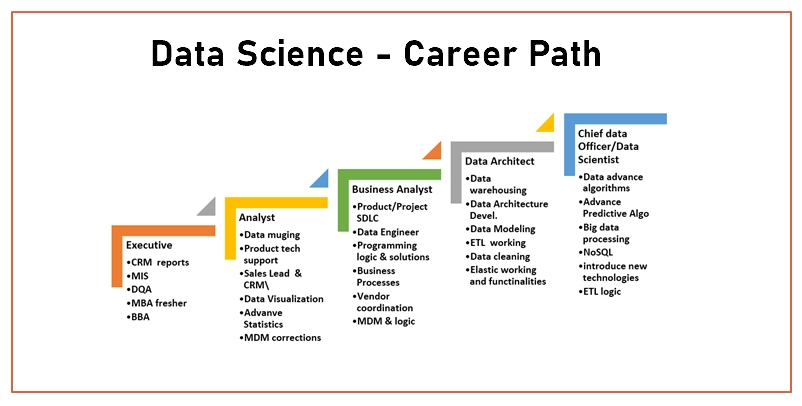Data Science Career Path: 9 Ways to Make an Income | RoadMap

The Data Science Career Path gives you many opportunities to make an income: Data science has emerged as a highly sought-after field with immense potential for career growth and income generation. In this blog post, we will explore some of the most lucrative career paths in the data science industry and the opportunities they present for professionals to make a significant income.
(1) Some specific skills that are in high demand in the data science industry are:

In the data science career path, several specific skills are in high demand due to the ever-evolving nature of the field and its increasing importance in various sectors. Here are some of the skills that are particularly sought after:
- Machine Learning: Expertise in developing, fine-tuning, and deploying machine learning models is crucial. This includes knowledge of various algorithms, model selection, and hyperparameter optimization.
- Deep Learning: Proficiency in deep learning techniques and frameworks like TensorFlow and PyTorch for tasks such as computer vision, natural language processing, and speech recognition.
- Data Analysis: Strong skills in data manipulation, cleaning, and exploratory data analysis using tools like Python, R, or SQL.
- Data Visualization: The ability to create informative and visually appealing data visualizations using tools like Matplotlib, Seaborn, or Tableau.
- Statistical Analysis: A solid foundation in statistics, including hypothesis testing, regression analysis, and statistical inference.
- Big Data Technologies: Familiarity with big data platforms such as Hadoop and Spark for handling and processing large datasets.
- Data Engineering: Skills in data pipeline development, data warehousing, and ETL (Extract, Transform, Load) processes, often with tools like Apache Airflow or Apache Kafka.
- Programming: Proficiency in programming languages such as Python and R, as well as the ability to work with libraries and frameworks commonly used in data science, like scikit-learn, pandas, and NumPy.
- Database Management: Understanding of database systems and query languages (e.g., SQL) for efficient data retrieval and storage.
- Cloud Computing: Knowledge of cloud platforms like AWS, Azure, or Google Cloud for data storage, processing, and deployment of data science applications will help yo in Data Science Career Path.
- Natural Language Processing (NLP): Skills in NLP techniques and libraries for text analysis and sentiment analysis, including NLTK and spaCy.
- Computer Vision: Familiarity with computer vision tasks and frameworks, such as OpenCV and image recognition models.
- A/B Testing: Experience in designing and conducting A/B tests to assess the impact of changes in products or services.
- Time Series Analysis: Expertise in analyzing time-series data, which is common in finance, IoT, and other domains.
- Data Ethics and Bias Mitigation: Understanding of ethical considerations in data science, including addressing bias and fairness in models.
- Domain Knowledge: Specialized knowledge in the industry or field where you work, which helps you apply data science effectively to real-world problems.
- Communication: Strong communication skills to convey complex findings and insights to non-technical stakeholders.
- Business Acumen: The ability to align data-driven insights with business objectives and make strategic recommendations.
(2) How to leverage your skills to generate additional income in the data scientist career bath
Freelancing and consulting in the data science industry can be lucrative endeavors, and there are several key strategies to make the most of your skills and generate income in this space.
- Firstly, establishing a strong professional brand is essential. This involves creating a professional website or LinkedIn profile that highlights your expertise and success stories, helping you stand out in your data science career path.
- Networking is another critical component. Attending industry events and engaging with professionals in your field can lead to valuable connections and opportunities. Identifying a specific target market or niche within data science, such as healthcare or natural language processing, allows you to position yourself as an expert and cater to unique client needs.
- A portfolio of projects is vital to showcasing your capabilities. These projects should demonstrate your problem-solving skills using data-driven approaches, serving as tangible proof of your expertise. Effective marketing through digital channels, content creation, and thought leadership can help reach potential clients.
- Delivering exceptional results is crucial for client satisfaction and referrals. Positive client feedback builds your reputation as a reliable data scientist. When it comes to pricing and contract negotiation, be flexible in determining rates and consider offering various pricing models to accommodate client preferences.
- Continuous learning is essential in the data science field, which constantly evolves. Staying updated through online courses, workshops, and conferences allows you to remain marketable and provide innovative solutions to clients. By implementing these strategies, data scientists can successfully leverage their skills for freelance and consulting work, opening up income-generating opportunities
Within the data science career path, there are several in-demand skills and specializations that can command higher salaries or consulting rates due to their scarcity and high value in the industry. Here are some of them:
- Machine Learning and Deep Learning: Proficiency in machine learning and deep learning techniques is highly sought after. The ability to develop and implement complex algorithms for tasks like image recognition, natural language processing, and recommendation systems can command higher salaries due to the demand for these skills.
- Big Data and Distributed Computing: With the increasing volume and complexity of data, skills in handling big data using technologies like Hadoop, Spark, and distributed computing frameworks can lead to higher-paying opportunities. Data scientists who can efficiently process and analyze large-scale datasets are highly valued.
- Natural Language Processing (NLP): NLP involves understanding and generating human language, and it has applications in areas such as sentiment analysis, chatbots, and language translation. Data scientists with expertise in NLP techniques and frameworks like NLTK, SpaCy, or Transformers are in high demand.
- Data Visualization and Communication: The ability to effectively communicate insights through visualizations and storytelling is crucial. Skills in data visualization tools like Tableau, Power BI, or Python libraries like Matplotlib and Seaborn can command higher rates as they enable data scientists to present complex information in a clear and compelling manner.
- Domain Knowledge: Data scientists with expertise in specific industries, such as finance, healthcare, or e-commerce, are often in high demand. Understanding the domain-specific challenges and being able to apply data science techniques to solve industry-specific problems can result in higher salaries or consulting rates.
- Time Series Analysis: Time series data is prevalent in fields such as finance, economics, and forecasting. Data scientists skilled in time series analysis techniques and forecasting models are highly valued due to their ability to extract insights and make accurate predictions from time-dependent data.
- Cloud Computing and Deployment: Proficiency in cloud platforms like Amazon Web Services (AWS), Microsoft Azure, or Google Cloud Platform is increasingly important. Data scientists who can leverage cloud infrastructure for scalable data processing, model deployment, and management are often well compensated.
- Ethical and Responsible AI: As AI becomes more pervasive, the need for ethical considerations and responsible AI practices is growing. Data scientists who understand the ethical implications of AI and can implement responsible AI frameworks and practices are highly sought-after.
(4) Are there specific sectors in the data science career path industry that tend to earn higher salaries or have more earning potential?
Yes, there are specific industries and sectors where data scientists tend to earn higher salaries and have greater earning potential. Data science skills are in high demand across various fields, but some industries are known for offering more lucrative compensation due to the complexity of the data challenges they face or the potential impact of data-driven insights.
Here are some industries known for offering higher salaries or greater earning potential for data scientists:
- Technology: The technology industry, including companies in software development, AI, and cloud computing, often offers higher salaries for data scientists. These companies heavily rely on data science to develop innovative products, improve user experiences, and optimize their operations.
- Finance and Banking: The finance and banking sector places a high value on data science for risk modeling, fraud detection, algorithmic trading, and customer analytics. Data scientists in this industry can earn higher salaries due to the complexity and sensitivity of financial data and its potential impact on business outcomes.
- Healthcare: The healthcare industry is increasingly leveraging data science to improve patient outcomes, optimize operations, and conduct research. Data scientists with expertise in healthcare analytics, medical imaging analysis, or genomics can command higher salaries in this data science career path.
- E-commerce and Retail: E-commerce and retail companies heavily rely on data science for customer segmentation, personalized marketing, demand forecasting, and supply chain optimization. Data scientists who can drive revenue growth and operational efficiencies in these industries often earn competitive salaries.
- Consulting and Professional Services: Data science consulting firms or professional services companies that offer data analytics and data-driven insights to clients across various industries can provide lucrative opportunities for data scientists. These firms often charge premium rates for their expertise and can offer higher earning potential.
- Energy and Utilities: The energy and utilities sector utilizes data science for optimizing energy generation and distribution, predictive maintenance, and resource management. Data scientists with expertise in energy analytics or smart grid technologies can find well-paying opportunities in this field.
- Manufacturing and Industrial Sectors: Manufacturing and industrial companies employ data science to improve production processes, quality control, and predictive maintenance. Data scientists who can optimize operations and reduce costs through data-driven insights can earn higher salaries.
Note that salary levels can vary based on factors such as region, company size, experience level, and specific job responsibilities.
(5) What strategies can be employed to negotiate higher salaries or compensation packages in the data science career path for a new job?
When seeking new job opportunities as a data scientist, there are several effective strategies to negotiate higher salaries or compensation packages. First, research salary benchmarks specific to your industry, location, and experience level. Websites like Glassdoor, Payscale, and LinkedIn Salary Insights provide valuable information to understand the market rate and justify your salary expectations.
During negotiations, highlight your value to the organization. Emphasize your skills, experience, and achievements that align with the company’s goals and challenges. Clearly demonstrate how your data science expertise can positively impact their business outcomes, justifying a higher salary based on the value you can provide.
Leverage multiple job offers or opportunities in the pipeline to your advantage. Inform the prospective employer of competitive offers, expressing your genuine interest in their organization, to create urgency and enhance your bargaining power.
If you possess unique or specialized skills, emphasize them during negotiations, showcasing how they can address the company’s specific challenges and warrant a higher compensation package.
In Consider the entire compensation package, including benefits, bonuses, equity, vacation time, and flexible work arrangements. If the employer can’t meet your salary expectations, negotiate for additional non-monetary perks that are important to you.
Timing is crucial, so avoid discussing salary too early in the interview process. Wait until you have a clear understanding of the role and expectations with a formal job offer. Initiate salary discussions when the employer is keen on hiring you, giving you more negotiation leverage.
Practice effective communication throughout the process. Clearly express your salary expectations with supporting data and research. Be confident, professional, and respectful during negotiations, aiming for a win-win scenario where both parties are satisfied.
Lastly, the Data Science Career Path considers long-term growth within the organization. Discuss opportunities for career progression, additional responsibilities, or promotions in the future, which can compensate for a lower starting salary if they align with your long-term career goals.
(6) Are there alternative ways in the data science career path to monetize their expertise?

Yes, data scientists have alternative ways to monetize their expertise beyond traditional employment. Here are some avenues for data scientists to consider:
- Creating and Selling Data Science Courses: Data scientists can leverage their knowledge and experience to create online courses or educational content focused on data science. Platforms like Udemy, Coursera, or Teachable provide opportunities to reach a wide audience and monetize their courses.
- Writing books or eBooks: Data scientists can write books or eBooks on data science topics, targeting both technical and non-technical audiences. Publishing a book can establish credibility, expand professional networks, and generate income through book sales and royalties.
- Consulting and Freelancing: Data scientists can offer consulting services or work as freelancers, providing their expertise to organizations on a project basis. This allows them to work on diverse projects, set their own rates, and have flexibility in choosing clients and engagements.
- Developing and Selling Data Science Tools or Software: Data scientists can create and sell data science-related tools, software, or frameworks that address specific needs or challenges in the industry. This could include libraries, APIs, data visualization tools, or machine learning models.
- Building Data Science Applications: Data scientists can develop data-driven applications or solutions that solve specific problems or deliver insights to end-users. These applications can be monetized through licensing, subscription models, or revenue-sharing arrangements.
- Data Science Training and Workshops: Offering training sessions, workshops, or corporate training programs on data science can be a lucrative endeavor. Many companies and professionals are seeking to enhance their data science skills, and data scientists can provide tailored training programs to meet those needs in the Data Science Career Path.
- Participating in Kaggle Competitions: Kaggle is a platform where data scientists can participate in machine learning competitions and showcase their skills. Winning or ranking highly in these competitions can enhance their reputation and open doors for consulting opportunities or job offers.
- Blogging and Content Creation: Data scientists can start a blog or contribute to industry publications, sharing their insights, tutorials, and best practices. Monetization can be achieved through advertising, sponsored content, or affiliate marketing.
Note: that monetizing expertise through these alternative avenues requires entrepreneurship, marketing, and business skills in addition to technical expertise.
(7) What are some potential income streams or business models to explore in a data science career path?
Data scientists have diverse income streams and business models to explore, making the most of their expertise in data analysis, machine learning, and data-driven decision-making. Some avenues to consider following the following in the Data Science career path:
- Consultancy Services: Providing organizations with strategic guidance, data audits, and custom solutions to address their data-related needs.
- Custom Data Science Solutions: building predictive models, recommendation systems, or fraud detection algorithms tailored to specific clients and selling them as software licenses, subscriptions, or projects
- Software as a Service (SaaS): developing and offering data-driven software solutions like analytics platforms or machine learning tools on a subscription basis for recurring revenue
- Data Product Development: Creating and selling data products such as data sets, APIs, or data-driven applications to clients in various industries
- Training and Education: Offering training programs, workshops, or online courses to individuals and organizations looking to enhance their data science skills
- Freelancing and Gig Economy: Taking on short-term data science projects on platforms like Upwork, Freelancer, or Toptal, allowing exposure to diverse industries and projects
- Data-Driven Research and Insights: Conducting research and analysis on specific domains and selling data-driven insights, reports, or subscription-based access to industry trends and patterns
- Partnerships or collaborations: joining forces with other professionals or organizations to jointly develop and market data science solutions, expanding customer reach and resources.
Note: that each business model may require different skill sets, resources, and marketing strategies.
(8) Are there opportunities to earn passive income in the data science career path?

To effectively market themselves as data scientists and attract high-paying clients or job offers, professionals can employ several strategic approaches. Building a strong online presence is paramount, with a personal website or portfolio and a well-maintained LinkedIn profile showcasing expertise and experience. Creating a portfolio of data science projects and case studies demonstrates problem-solving abilities and technical proficiency. Contributions to open-source projects or the development of data science tools display commitment and expertise. Publishing thought leadership content, participating in data science competitions, and pursuing continuous learning highlight skills and adaptability.
Active involvement in the data science community through networking, conferences, and presentations fosters connections and professional opportunities. Seek recommendations and testimonials from previous clients or colleagues to enhance credibility. Tailoring resumes and cover letters to emphasize relevant skills and achievements is essential, and leveraging professional networks can help establish expertise. These strategies collectively enhance visibility, credibility, and attractiveness to high-paying clients and employers in the data science career path.
(10) Are there emerging trends or technologies within the data science career path industry to generate income?
- Artificial Intelligence (AI) and Machine Learning (ML): AI and ML continue to advance rapidly and offer numerous opportunities. Professionals can develop AI-powered products or services, such as recommendation systems, predictive analytics tools, or automated decision-making systems. They can also provide consulting services to help businesses adopt AI and ML technologies or develop custom ML models for specific applications.
- Natural Language Processing (NLP): NLP focuses on understanding and processing human language. With the increasing demand for chatbots, virtual assistants, and language-based applications, professionals can build NLP-driven solutions or offer NLP consulting services. Opportunities exist in areas like sentiment analysis, language translation, text generation, and voice recognition.
- Computer Vision: Computer vision involves extracting information from visual data, enabling applications such as image recognition, object detection, and autonomous vehicles. Professionals can develop computer vision solutions for industries like healthcare, retail, security, or manufacturing. Opportunities also exist in areas like facial recognition, augmented reality, and video analytics.
- Edge Computing: Edge computing refers to processing data closer to the source rather than relying on centralized cloud infrastructure. With the proliferation of IoT devices, there is a growing need for data processing and analytics at the edge. Professionals can develop edge computing solutions, optimize algorithms for resource-constrained devices, or provide consulting services on edge deployment strategies.
- Data Privacy and Ethics: In the Data Science Career Path, as data privacy concerns increase, professionals can offer services related to data governance, privacy compliance, and ethical AI. They can develop tools or services that help organizations protect and manage data while ensuring compliance with regulations like GDPR or CCPA. Consulting on ethical considerations in AI and ML can also be valuable.
- Automated Machine Learning (AutoML): AutoML focuses on automating the process of building machine learning models. Professionals can develop AutoML platforms, tools, or libraries that simplify and accelerate the model-building process for non-experts. They can also provide consulting services to help businesses leverage AutoML for faster model deployment and improved decision-making.
- Explainable AI: Explainable AI aims to provide transparency and interpretability of AI models and their decision-making processes. Professionals can develop techniques and tools to explain and interpret complex ML models, enabling businesses to understand and trust AI-driven decisions. They can also provide consulting services to help organizations adopt explainable AI practices.
- Data Analytics for Sustainability: Data Science Career Path, growing concerns about climate change and sustainability create opportunities for professionals to apply data science and analytics to address environmental challenges. They can develop analytics solutions to optimize energy consumption, analyze environmental data, or provide insights for sustainable business practices.
- Blockchain and Data Science: The integration of blockchain technology and data science offers opportunities for professionals. They can develop blockchain-based solutions for data privacy and security, create decentralized data marketplaces, or provide consulting services on blockchain implementation for data-intensive applications.
- Industry-Specific Applications: Professionals can specialize in data science applications tailored to specific industries, such as healthcare, finance, marketing, or logistics. By understanding industry challenges and requirements, they can develop industry-specific solutions or offer consulting services to optimize processes, improve decision-making, or drive innovation.
How to Start a Career in Data Science Industry
See Also:
- 9 Easiest Skills to Learn to Make Money Online
- Best Affiliate Marketing Programs for Beginners To Earn
- 7 Pro Tips for Earning Extra Money Through YouTube Affiliate
- Earn Money from Quora Partner Program [Tips & Tricks]
- Make Money with Digital Marketing
- How to Make Money with Web Scraping using Python
- Can You Make Money With Salehoo
- Top Marketing Agencies in USA to Make Money
- Make Money with (8) Best Amazon Affiliate WordPress Plugins
- How To Make Money With Anime Affiliate Programs: 5 Top Anime







